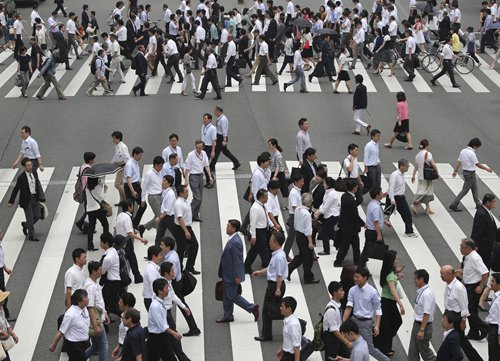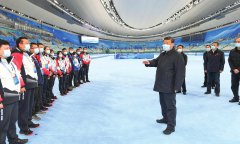
People cross a road in Tokyo, Japan. Photo:IC

The Tokyo 2020 Olympic Games mascot Miraitowa (left) and Paralympics mascot Someity Photo:IC
Japan's famously diligent workers spend more hours at the office than employees in almost any other country. But to avoid traffic chaos at next year's Olympic Games, authorities have a message: Stay home.
Hundreds of thousands of people are expected to attend Olympic and Paralympic events in Tokyo during the 2020 Games, putting additional strain on the city's already notoriously crowded commuter routes.
Officials also hope that promoting working from home during the Games will encourage a more easy-going approach in a country known for its cases of karoshi, or death from overwork.
"We are expecting... up to 920,000 spectators and Olympic staff members a day," said Kasumi Yamasaki, who oversees transport issues for the Games at the Tokyo Metropolitan Government.
Experts expect a 10 percent rise in passengers on trains, and a 20 percent increase in express highway users, which could result in lengthy delays and even dangerous crowding.
Railway operators are planning to put more trains into service but "railway transportation is already at full capacity during the rush hours from 7 to 9 am," Yamasaki told AFP.
On July 22, one year before the Games, Tokyo rolled out a month-long "Telework Days" campaign, with government offices and private business committing to avoiding peak commuting hours.
Nearly 3,000 companies including auto giant Toyota and trading house Sumitomo Corp are taking part.
The concept isn't entirely unfamiliar in Japan, where the government has been urging employers to be more flexible, hoping to help parents and others caring for elderly relatives to better balance their work and home responsibilities.
'Stress-free lifestyle'
The efforts have run up against various obstacles, said Kanako Nakayama, an internal affairs ministry official in charge of telework.
"Concerns over the security of sensitive information, the difficulty of controlling working conditions, and the fact that corporate culture stresses the importance of face-to-face communications have deterred" some firms, she told AFP.
Officials hope the campaign will show firms that employees can actually "work even more effectively" when they stay home, she added.
That has been Yoshie Midorikawa's experience.
She starts her day by opening her laptop at home and sending her colleagues a message on a smartphone app, letting them know she is online after dropping her daughter at a nearby nursery.
"You can save lots of time and energy that would have been used for commuting, especially when trains are delayed or carriages are crowded," said Midorikawa, 42, a sales manager at technology firm Kunai.
"I can work effectively since you don't have to pick up telemarketer calls here," she said in her quiet, neat living room.
Experts and government officials hope that Olympic efforts to expand telework might serve as something of a legacy for the Games.
Tokyo 2020 "is a chance to actively introduce telework, which can create a stress-free lifestyle," said Azuma Taguchi, a professor of engineering at Chuo University.
He is among the loudest voices urging authorities to take serious measures to tackle Olympic traffic, warning of potentially "fatal congestion" if action is not taken.
Take a 'workation'
Others also see the Games as a chance to break existing work habits.
"This is a chance to make telework a legacy of the Games that will take root" in Japanese society, Industry Minister Hiroshige Seko said in a recent forum to promote flexible work.
And some officials are hoping that a more open-minded approach to work could encourage people to take "workations" - working remotely from far-flung locations with attractive leisure options.
Several towns have already used government subsidies to build offices intended to attract people for temporary "workations" or encourage companies to set up satellite hubs.
Shirahama, a small town in western Japan, now has two business office buildings packed with workers.
"We made sales pitches to companies that we have beaches, hot springs, and good access to an airport that connects with Tokyo's Haneda airport," local official Masakatsu Ogawa told AFP.
The town's revenue from corporate tax has skyrocketed "but we also received benefits that can't be expressed in figures - a vibrant community with young people from the cities," he said.
The town has already started planning construction of a third office building, and has big dreams, said Ogawa.
"We're aiming to become Japan's Silicon Valley."
Newspaper headline: Time for telework











